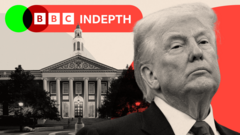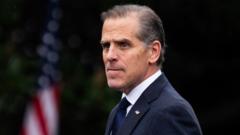As Trump wages a high-profile battle against Harvard, reactions within academia reveal deep-seated tensions over ideological control, with implications that may reshape institutions nationwide.
The Lingering Effects of Trump's standoff with Harvard University

The Lingering Effects of Trump's standoff with Harvard University
Trump’s aggressive measures against Harvard University signify a broader cultural war in American higher education, provoking fears of altered academic landscapes.
In the past week, former President Donald Trump's administration has escalated its conflict with Harvard University, catalyzing a wave of scrutiny and potential repercussions that could impact American higher education for years to come. Beginning Monday, Trump proposed reallocating $3 billion in research funding from Harvard to vocational schools, sparking controversy and concern amongst students and faculty alike. The following day, the White House directed federal agencies to review and possibly cut the approximately $100 million in government contracts Harvard receives.
Trump's comments underscored his view that the institution is disrespecting the nation, further illustrating a pattern of aggressive directives that could unsettle the very foundations of Ivy League education. Harvard's collection of federal grants and its prestigious reputation have made it a primary target, with drastic measures including suspending foreign student admissions and freezing research funding under severe scrutiny.
Critics argue these actions extend beyond mere university policy, indicating a systematic attempt to erode traditional Democratic support within academia. The administration's justification includes allegations of Harvard's inability to effectively combat antisemitism following the surge of Israel-related protests on campuses. In a recent congressional hearing, former Harvard president Claudine Gay faced backlash for her ambiguous response regarding whether calls for violence against Jews violated university policies.
Trump's administration has proposed a series of stringent reforms targeting universities, including calls for greater 'viewpoint diversity' and dual responses to antisemitic expressions. Under these directives, institutions such as Columbia have revisioned campus policies under threat of funding cuts. This incitement has led to alarm in the academic community, echoing that if Harvard can face such federal scrutiny, then no institution is safe from governmental influence.
In this environment, community concerns have been fueled by anxieties over the possible reformation of university culture and ideology. Reflecting these sentiments, students at Harvard's latest commencement expressed unease, fearing that these measures could instigate a broader shift favoring conservative values in higher education.
While the administration sees its actions as necessary to address perceived biases in academia, critics argue this approach risks ruining the diverse intellectual landscape that colleges offer. Some conservatives applaud these efforts as overdue pushbacks against liberal indoctrination.
As resistance mounts, Harvard's leaders have taken their grievances to court, with a federal judge suspending the administration’s push against foreign student visas. Harvard’s president has reiterated the institution's commitment to academic integrity and its historical role within American society.
Polls show a divide; while Trump's constituent base supports his policies, the general public tends to back universities and disapprove of funding cuts. With multiple stakeholders and conflicting ideologies poised to confront each other, the battle between Trump's administration and academia appears set to define a transformative era that may forever alter the educational landscape.
The ramifications of these strategies remain uncertain, yet the very act of engagement hints at a larger narrative – one where walls protecting scholarly independence and free thought in American universities are beginning to fracture under the weight of political warfare.


















